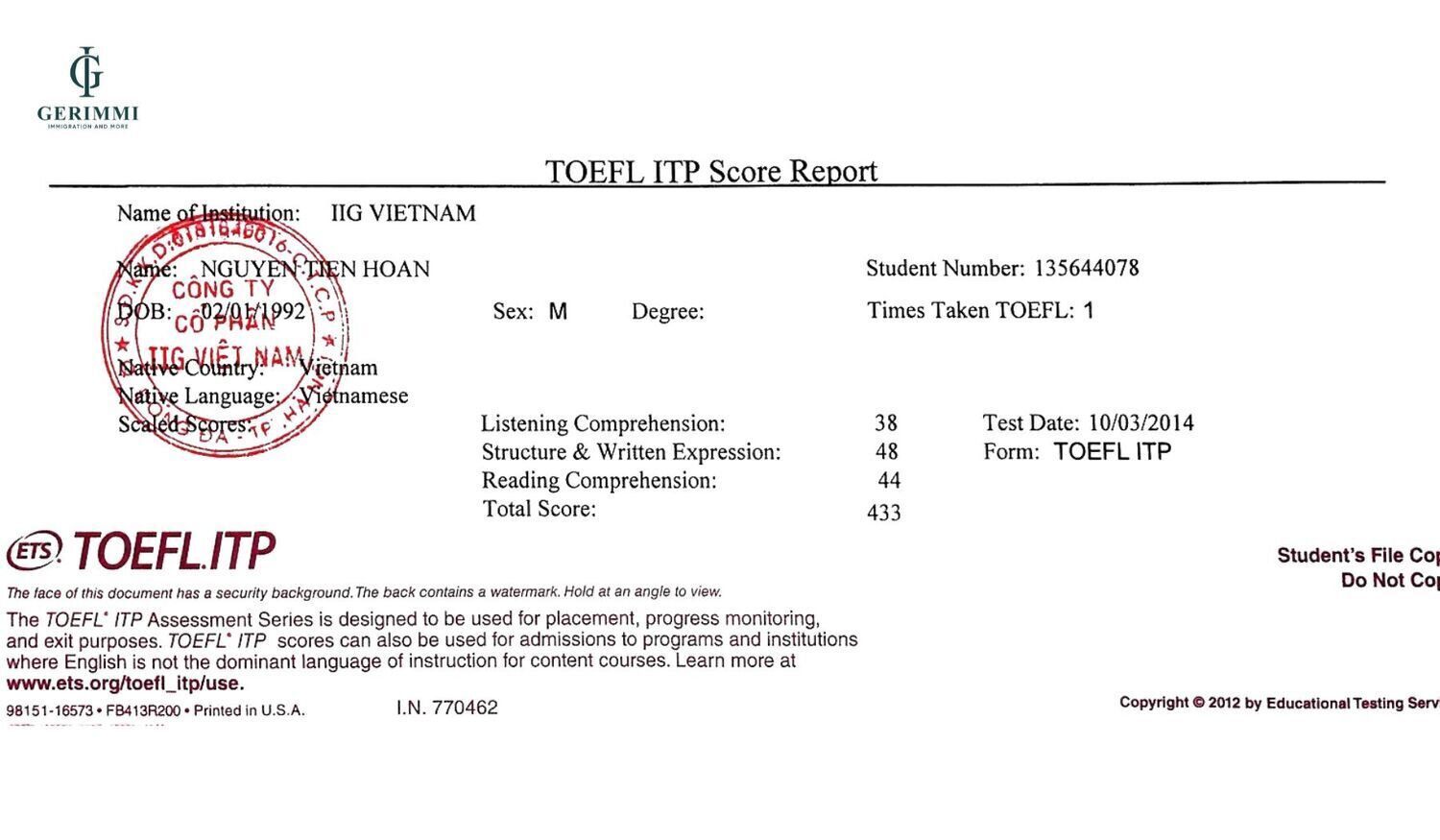IELTS has long been a big barrier for many young people who dream of studying abroad. Not everyone has the conditions, time or ability to achieve a band score of 6.0+. However, in recent years, more and more countries have become more flexible in their admission policies, opening up opportunities to study abroad without IELTS. Especially suitable for Vietnamese students who have practical English skills but do not have an official certificate.
I. Why do many people choose to study abroad without IELTS?
More and more young Vietnamese people are looking for study abroad programs that do not require IELTS. Not everyone has the time, conditions or confidence to pass this international English exam. Below are common reasons why international students prioritize choosing this path."study abroad without IELTS certificate":
1. IELTS test pressure: Expensive, stressful and not suitable for everyone
The IELTS exam is always considered a difficult test for many Vietnamese students. The exam requires comprehensive English skills and the ability to perform under high pressure. Many students have to spend months, even years, to study. The cost of taking and preparing for the IELTS exam is not small, usually ranging from 4-6 million VND per exam, not to mention the tuition fees for intensive exam preparation courses.
Taking the test over and over again but not achieving the required band score (usually 6.0 or higher) makes many students lose their spirit. In addition, the skill imbalance, such as good listening but poor writing, also makes achieving an even score challenging.
2. No IELTS but still have practical English ability
Many students, although not possessing an IELTS certificate, are able to use English fluently thanks to studying at international schools or bilingual programs since high school. These students can confidently communicate, study and work in an international environment without encountering language barriers.
Instead of requiring IELTS, some schools accept assessment based on academic records, letters of recommendation from teachers, or entrance interviews to prove English proficiency. This is a more practical, flexible and suitable assessment method for the abilities of many Vietnamese international students.

3. International schools are becoming more flexible
Global admissions trends are now becoming more open with flexible policies, especially for students from Southeast Asia. Many universities and colleges have implemented preparatory English programs such as pathways, foundations, or ELICOS to allow students to improve their language skills before entering the main course.
In addition, many schools also accept IELTS alternative certificates such as Duolingo, TOEFL iBT, or require students to take the school's entrance exam. This opens up greater opportunities for those who do not have IELTS but still want to start their study abroad journey.
4. Don't want to delay your study abroad plan because of waiting for IELTS score
Waiting for the right IELTS certificate sometimes causes many students to miss important admissions or scholarship opportunities. IELTS exams are often held several weeks apart, and waiting for results can also prolong the study abroad journey beyond expectations.
Meanwhile, choosing programs that do not require IELTS helps you be more proactive in terms of time, easily arrange your study plan and apply for a visa on time. This is especially useful for those who are ready in terms of academic ability and finance, but are "stuck" because of an English certificate.
II. Countries that are “easy” to accept international students without IELTS
1. Germany
Germany is famous for its tuition-free and top-quality higher education in Europe. In particular, international students including Vietnam can study in Germany without IELTS, if they meet some flexible requirements from the school.
Many universities in Germany accept alternative certificates to IELTS such as:
- TOEFL iBT
- Duolingo English Test
- Internal English certificate from previous university or English-taught program
- English entrance test or face-to-face interview
For some international programs, if you have studied a bilingual or international program at high school or university level, you can submit your transcript with a letter of English proficiency confirmation from your previous school instead of an IELTS certificate.
In addition, university preparatory courses (Studienkolleg) in Germany often do not require IELTS for admission, but only require passing the entrance exam (Aufnahmeprüfung), which includes a German or English section depending on the field of study.

2. Canada
Canada is a top study abroad destination with flexible admission policies. Many colleges and universities in Canada do not require IELTS if you enroll in English language preparation courses (ESL, EAP) before entering the main program.
Additionally, if you have studied in a bilingual or international program in Vietnam, you may be exempted from the IELTS requirement if you provide appropriate transcripts and letters of recommendation. Some schools also accept internal tests or Duolingo or TOEFL certificates instead.
3. Australia
Australia is famous for its ELICOS system, an academic English program specifically for international students who do not have enough IELTS scores. You can apply directly to universities through a pathway that integrates an ELICOS course, without having to submit an IELTS certificate from the beginning.
Many schools in Australia also accept direct interviews or internal English scores instead of IELTS, especially in emergency admissions. This creates ideal conditions for those who are ready to study abroad but do not have an English certificate yet.
4. Finland
Finland is becoming an increasingly attractive destination for Vietnamese students thanks to its top-quality education in Europe and flexible admission policies. Many universities of applied sciences and research universities in Finland do not require IELTS if you meet one of the following conditions:
- Have studied an English program at high school or university before.
- Be able to take and pass the school's English entrance exam.
- Participate in an online interview to assess real-world language skills.
In addition, universities in Finland often organize their own entrance exams, which include an integrated English assessment, so you can be considered for admission without an IELTS certificate.
Finland also has many tuition-free scholarships or living allowances for international students, which are ideal for those with good academic ability but not yet ready to take the IELTS exam. The visa policy also supports students with an official letter of admission from the school, regardless of whether they have an English certificate or not.

5. Singapore
Being a country close in terms of geography and culture, Singapore is an ideal choice for those who do not have IELTS. Many private schools and international academies here do not require English certificates if you can take the entrance exam or complete the preparatory English program at the school.
Some schools also accept students who have studied at international or bilingual schools in Vietnam, waiving the IELTS certificate requirement if they meet the academic and interview requirements.
6. Malaysia
Malaysia is a friendly, affordable study abroad destination for international students, especially Vietnamese students. Universities here often have preparatory English programs for students without IELTS, helping you easily meet the entry requirements without having to take an international certificate exam.
Furthermore, the Malaysian education system has links with many schools in the UK, Australia, and the US, so you can transfer after 1-2 years of study without interruption. The visa policy is also not too strict on English certificates, as long as you follow the approved study path.
III. Alternative forms of IELTS when studying abroad
In the context of integration and digital transformation, many universities and countries have adopted more flexible forms of English proficiency assessment, helping international students - especially Vietnamese students - to easily access study abroad opportunities without having to possess an IELTS certificate. Some popular alternatives include:
- Duolingo English Test (DET) Certificate
This is an online English proficiency test that can be taken at home in 1 hour. The test comprehensively assesses listening, speaking, reading, and writing skills with increasing difficulty. It is low cost (about 49 USD), has fast results (48 hours), and is recognized by more than 4,000 universities worldwide, including those in the US, Canada, Australia, and Europe.
- TOEFL iBT
TOEFL iBT is a highly prestigious academic English certificate, widely recognized as IELTS. It also assesses all 4 skills but is conducted entirely on a computer. The results are often accepted by universities as an entrance criterion instead of IELTS.
- School Placement Test
Some international schools do not require IELTS but will organize a separate test or an entrance interview to directly assess your English level. This is a good opportunity if you are confident in your actual ability but have not yet taken an international certificate exam.
- Letter of English proficiency from high school or university
If you have studied in an international school, bilingual program, or have an International Baccalaureate (IB) diploma, you can request a letter from your school or teacher to demonstrate your ability to use English for academic purposes.
- Pre-sessional English Pathways (Foundation, Pathway, ELICOS, etc.)
This program is for students who do not meet the English language entry requirements. You will study academic English at the school for 10 weeks to 12 months, before starting the official program.

IV. Other conditions to prepare when not having IELTS
When choosing a study abroad program that does not require IELTS, you need to ensure that other elements in your application are carefully prepared to increase your chances of being accepted by the school and successfully applying for a visa:
- Good academic performance, GPA from 6.5 - 7.0 or higher:Grade Point Average is still an important criterion to evaluate academic ability. For those who do not have IELTS, academic scores also need to be outstanding to create a competitive advantage.
- Have studied in an English environment: Studying at international schools, bilingual programs, or completing some courses in English helps you demonstrate that you are capable of studying in an international university environment.
- Letter of recommendation from teacher or administrator: These letters should emphasize the ability to receive lectures in English, communication skills, presentation, teamwork in English. This is indirect evidence to replace IELTS.
- Statement of Purpose (SOP): SOP not only shows clear learning objectives, suitable for the major, but also demonstrates the ability to write academic English. SOP is written coherently, grammatically correct and in-depth will make a strong impression on the school.
- Full and transparent financial proof: In addition to academic and language ability, the ability to pay tuition and living expenses during the course of study is a key factor in obtaining an offer letter and visa.
- Interview skills: In some countries such as the US, Canada, or Australia (for subclass 500 visas), you may need to attend an interview with the school or consulate. The ability to communicate naturally and clearly in English, along with careful preparation, will help you make a strong impression.

V. Notes when choosing a program that does not require IELTS
Studying abroad without IELTS is an attractive option, but you still need to be careful when researching and choosing the right program. Here are some points to note:
- Check the specific requirements of each school and each major.: Even within the same country, each school and even each department can have different English entry standards. Some accept Duolingo, some only allow interviews, or require a mandatory preparatory English course.
- Learn more about the Academic English Preparation Program: These courses help you get acquainted with the international learning environment but at the same time increase the cost and lengthen the study time. You need to clearly determine how long you will study, what you will learn, and whether you can transfer to the main course or not.
- Prioritize choosing reputable and recognized schools: Some schools that “bend the rules” or promise easy admission may not guarantee the quality of teaching and cause difficulties when applying for a visa or transferring. Choose a school that is on the immigration department’s list and has a good ranking on international rankings.
- Compare tuition fees and overall living costs: Sometimes taking an additional preparatory English course can significantly increase the total cost. You need to calculate a specific budget to ensure that there is no interruption in your studies.
- Plan to take IELTS in the future if needed: Although not initially required, some courses, scholarships, or settlement programs may still require an IELTS certificate. Therefore, you should continue to practice English and plan to take the test when necessary.

Conclusion
Not having IELTS does not mean that the dream of studying abroad has to stop. With the flexibility of many countries and international schools, Vietnamese students can be more proactive in choosing the right path, saving time and money. Most importantly, invest in practical English skills.

